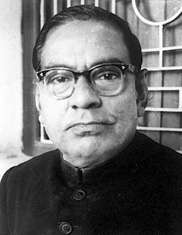Abul Mansur Ahmed
Abul Mansur Ahmed (Bengali: আবুল মনসুর আহমদ, 3 September 1898 – 18 March 1979) was a Bangladeshi writer, politician and journalist.[1] He was awarded Bangla Academy Literary Award in 1960 and Independence Day Award in 1979 by the Government of Bangladesh.[2] Amar Dekha Rajnitir Panchash Bachhar (1969) is his magnum opus.
Abul Mansur Ahmed | |
|---|---|
আবুল মনসুর আহমেদ | |
 | |
| Born | 3 September 1898 Dhanikhola, Mymensingh, Bengal Presidency, British India |
| Died | 18 March 1979 (aged 80) |
| Education | Bachelor of Law |
| Alma mater | Dhaka College Surendranath College |
| Occupation |
|
| Spouse(s) | Akikunnesa |
| Children | Mahfuz Anam |
| Parents |
|
| Awards | Bangla Academy Literary Award Independence Day Award |
Background and education
Ahmed's maternal grandfather Meherullah Faraizi took part in the non-communal anti-British Faraizi movement. Ahmed was born in Dhanikhola in Mymensingh to Abdur Rahim Farazi and Mir Jahan Begum.[2] Ahmad passed the Matriculation exam from Nasirabad Mrithunjoy Vidyalay in 1917 and the Intermediate exam from Jagannath College in 1919. Then he completed Bachelor of Arts from Dhaka College in 1921. He studied Law at Ripon College, Calcutta (later renamed Surendranath College) and passed the BL examination in 1929.[1] He got involved in Khilafat and Non-Cooperation movements.
Career
During 1929-1938 he practiced law in Mymensingh. Later, worked at Kolkata as a professional journalist and a political activist until the 1947 partition. He worked for The Krsak, Navayug, Ittehad, Soltan and The Mohammadi.
Ahmed joined the Congress movement under Subhas Chandra Bose. He became an active member of the Muslim League after the elections of 1937 and became an activist of the Pakistan movement since 1940. In 1954 United Front election he became elected member of parliament from Trishal, Mymensingh constituency. He was the principle author of 21-point program, the election manifesto of Jukta Front in 1954.[2] He was the provincial education minister in the United Front Cabinet under AK Fazlul Huq and the central commerce and industries minister and Deputy Prime minister of the Awami League government of Prime Minister Huseyn Shaheed Suhrawardy in 1957. He was the founder-secretary of the Awami Muslim League, later Bangladesh Awami League. He was imprisoned when Martial Law was declared by General Ayub Khan in 1958 and was released in 1962.
Works
Novels
- Satya Mithya (1953)
- Jiban Ksudha (1955)
- Ab-e-Hayat (1968)
Satires
- Aina (1936–1937)
- Food Conference (1944)
- Gulliverer Safar Nama
- Asmani Purdah,
Reminiscence
- Atto Katha (1978, autobiography)
- Amar Dekha Rajnitir Panchash Bachhar (1969)
- Sher-e-Bangla haite Bangabandhu (1972).
- Bangladesher Culture
Awards
- Bangla Academy Literary Award (1960)
- Independence Day Award (1979)
- Nasiruddin Gold Medal
References
- Rana Razzaque (2014), "Ahmed, Abul Mansur", Banglapedia: National Encyclopedia of Bangladesh, Asiatic Society of Bangladesh, retrieved May 6, 2015
- Emran Mahfuz (March 17, 2017). "Abul Mansur Ahmad: A Versatile Genius". The Daily Star. Retrieved March 17, 2017.